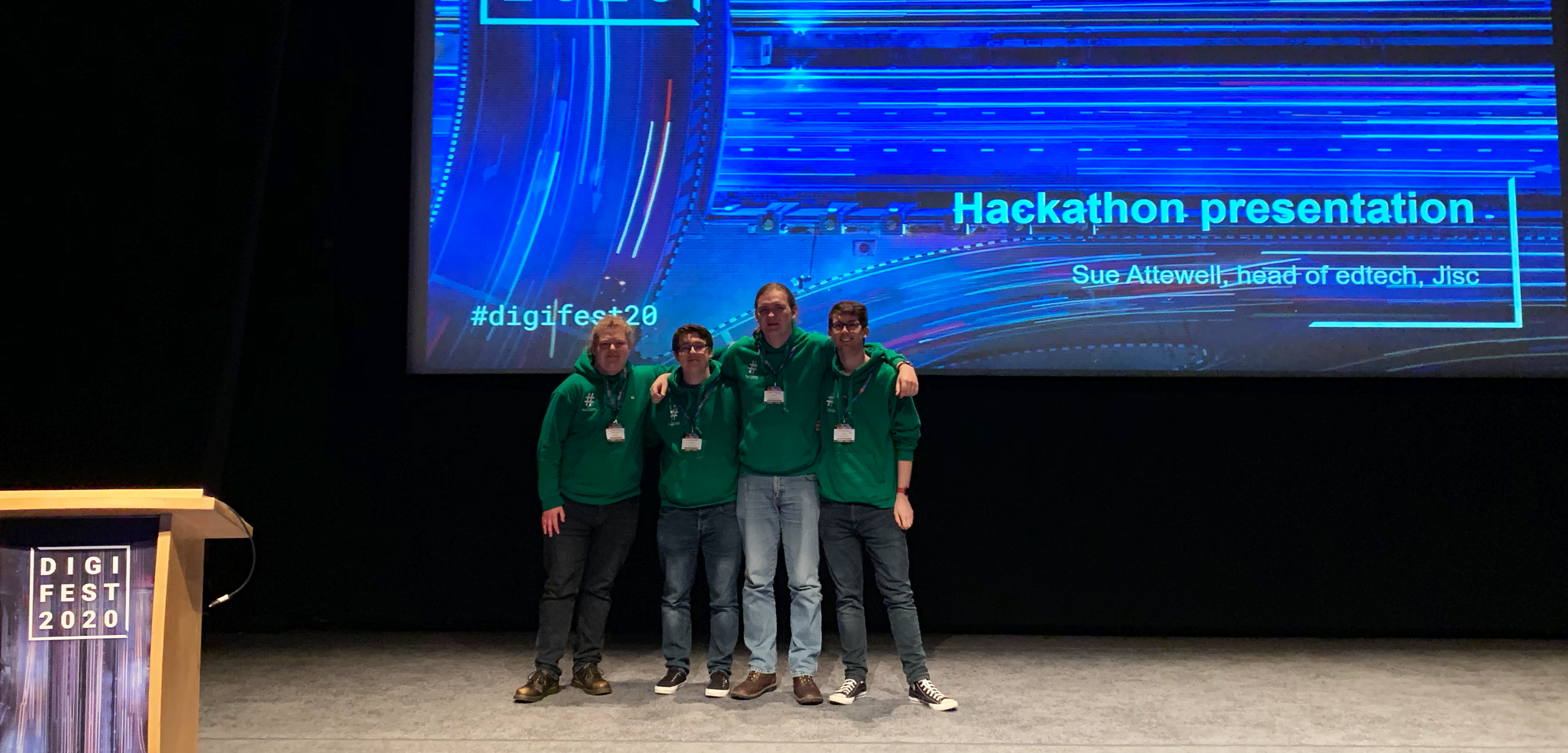Winning at DigiFest Hackathon 2020
Last week I headed down with Dan, Alex and Harry and went to the JISC DigiFest Hackathon at the ICC in Birmingham. After attending DigiFest and CAN last year and having a great time, we thought we’d go along again.
This year the teams were great too, with one group creating a game where you increase in XP for the better you do academically, two looked at chatbots (one for medical diagnosis and lecture feedback). Another looked at how holograms could work in the classroom.

What we set out to do
This hackathon we set out to address how to give students formative feedback earlier. The idea turned out even more appropriate during the current COVID-19 pandemic, as it means that students could get feedback at a distance from their lecturer automatically, and if built on, give automatic code-improvement suggestions to save lecturers further time.
Our primary motivation was to save lecturers time when marking assessments as if a tutor has to score and run 300 pieces of code individually; it takes significant time away from their daily teaching, researching or time spent producing lecture content. If all the outputs of a solution or API are tested, marking time can be spent instead on providing individual feedback on the overall solution produced.
Day 1: Travel and Meet
Alex and I caught the train down to Birmingham on Monday afternoon, and met Dan and Harry in Birmingham in the evening, checking into the hotel to talk about what we were going to build over the next two days, and how we’d realise our idea.
After a quick brainstorm, we headed over to The Indian Brewery to meet all the other teams taking part in the hackathon, and the JISC team and apprentices we knew from the previous event. We got to have a chat with the other teams and a catch-up, while we enjoyed some excellent food at the brewery.
Day 2: Code
Up at 7 am and raring to go, we headed down for a quick breakfast, before heading over to the ICC for 8.30 to get ready to start the hackathon properly. The team split, with me working with Harry who wanted to get some more experience working in React.
Dan and Alex (our DevOps engineer) took the lead on building out the CI pipeline using .NET Core and Docker, building containers for the right type of assessment uploaded and building and exposing the correct ports for the assessment submitted.
The pressure ramped up as we got towards 4 pm when we were to head down to the main event hall at DigiFest to network with the other attendees at the event. We met some interesting people, saw some cool new products on the Microsoft stand, get some stickers from Amazon and network with some industry professionals.

In the evening JISC took us out for wood-fired pizza at OTTO Pizza, the meal was great and we pretty much filled the small restaurant with the team. We chatted some more with the hackathon attendees about how their projects were coming along, then headed back for an early night and ready for a busy final day.
Day 3: Code more then present
Up bright and early again, grabbing breakfast and heading over to the ICC, we knew we didn’t have much time to complete the product and make a presentation. I got on with finishing the front-end while Harry helped Dan and Alex with a weird bug with containers failing, which turned out to be OneDrive overwriting Docker build files.

As the clock ticked down, I got a final version of the presentation together, ready for Harry to present on stage and checked with the projection team that HDCP wouldn’t cause issues with the projector. The presentation went great, and it was great to see what the other teams had been working on too.
The end product
We won the award for the most market-ready end-product and were pleased with the project that we created, and thought it was an exciting proof-of-concept that could be taken further, and expanded on to help the education field.

JISC very kindly covered our costs for the event - and a big thank you to Sue, Paul, Keith and the team for making it all possible. Thanks also to all the other teams in the competition, all the projects pitched were cool. Harry has also done a write up of this event, that you can read here.
Video
You can read more about how the solution worked on the project page here.